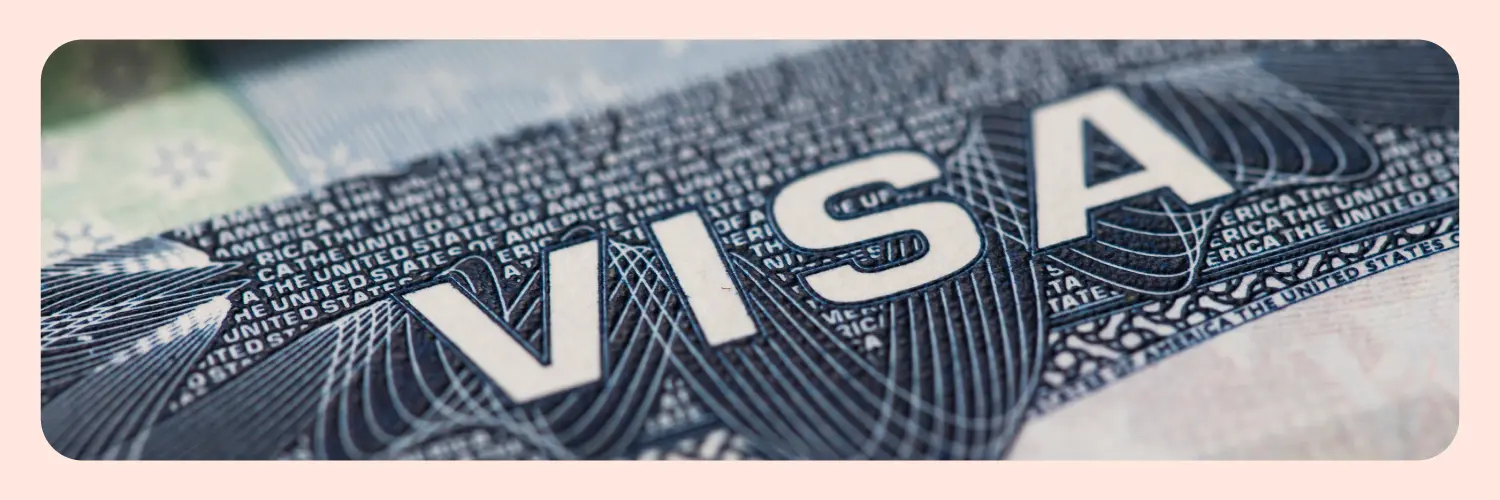
An Indian's Guide to Different Types of Visas
An Indian’s Guide to Different Types of Visas
share
![]()
What is a Visa?
Visas act as the means of entry into foreign countries to control access and the movement of foreigners into particular countries. Visas are essential for providing non-citizens with their identity, purpose, and duration of stay. The types of visa granted for a single trip, employment, study, or immigration to a particular nation must match the needed requirements.
Therefore, visas are waivers that make it easier for people to cross borders between foreign countries and form a worldwide network, whether seeking job prospects, academic goals, business commerce, or cultural discovery abroad.
Major Types of Visas
The major types of visas are as follows:
1. Tourist Vis
This type of visa is for people who travel abroad from the country where they belong to other countries for sightseeing or to visit friends and relatives. Single or multiple-entry tourist visas are valid for different periods depending on the guests’ intention for the trip and whether they belong to a privileged category concerning nationality.
For instance, Indian tourists can get both single-entry and multiple-entry tourist visas for Dubai. The single entry visa is available for 30 and 60 days. The multiple entry visa is available for 30 and 60 days and also 5 years.
Common features of the tourist visa application include:
- A passport that is valid for at least six months.
- A detailed travel plan will outline the activities/destinations one will visit and
- Proof of ability to sustain expenses with a possible air ticket.
Apart from the regular tourist visas, different countries issue electronic tourist visas to Indians to make the visa application process fast and easy through online avenues. The purpose of e-tourist visas lies primarily in facilitating the short-term traveller to apply for them online and to get the authorisation quickly.
2. Business Visa
The purpose of the business visa is to assist people in carrying out many business-related activities outside India, like establishing contacts, attending meetings, conferences, and/or negotiations.
The core purpose of a business visa is to facilitate the short-term business stay periods of people whose visit purposes are manifold and include exploring business opportunities, networking or participating in professional events.
The necessities for getting a business visa mainly include:
- An invitation letter from the hosting organisation in India
- A registration certificate showing proof of business and
- Documents displaying business solvency, among the bigger parts of visa application requirements.
Many countries provide two types of business visas: one is regular, and another one is e-visa. Electronic visas, which can be applied for the whole year, are a good option for business travellers because they allow for electronic submission and require visitors’ biometrics.
3. Employment Visa
An employment visa is issued to foreign nationals looking for work opportunities in a particular country. It is the type of visa applied by professionals and personnel of a company who are travelling outside India on temporary assignments, volunteers, etc.
Compared to tourist or business visas, work visas are unique as they allow the holder to work for a certain period of time in a foreign country.
There are fair conditions that employers must meet before they can sponsor employment visas. Some of them are:
- They should include the demonstrated need for foreign talent and compliance with labour market tests showing the unavailability of local candidates to fill the position.
- To successfully apply for a work visa, one needs to be ready to go through the complex procedure, where one may be expected to have a contract that describes the work tasks thoroughly, a list of educational qualifications and job experience.
The time limit of the employment visa varies from country to country. For example, a work permit or work pass for Singapore is typically issued for up to two years. However, it may differ from the employment term and depends on a variety of other details.
Other Visa Categories
In addition to tourist, business, and employment visas, various non-immigrant visas exist to accommodate diverse travel purposes:
- Transit Visa: A transit visa is needed when one travels to another country via a different country. For example, You can travel through Malaysia or stay there for a few days prior to going to your final destination with a Malaysian transit visa.
- Journalist Visa: The visa is given to professional journalists, photographers, and the entire media team who are engaged in journalistic undertakings and activities as per the coverage clause.
- Medical Visa: This visa is for medical treatments of Indian individbvuals and their companions, such as family members and caregivers in other countries.
- Missionary Visa: Individuals going outside the country with a purpose such as pilgrimage or related to their religious activities would require this visa.
All types of visa covers beings and have their own regulations, restrictions, and validity period, which are adjusted to the need of Indians to travel abroad.
Factors to Consider When Choosing a Visa
The factors to consider while choosing various types of visas are as follows:
- Purpose of Travel: Specify the main reason for a visit, whether it is tourism, business, work, or education. These could include educational background, job position, or age. For instance, a regular tourist visa will forbid you from working or being hired in a school, and a work visa could need sponsorship from a company.
- Duration of Stay: Depending on the categories of visa, there can be different lengths of visits that typically fall in the time frame of a few weeks to a few months and even permanent residency. Ensure the visa is valid for the same period to prevent warnings and legal hazards.
- Activities Planned During the Visit: Chalk out the activities you might indulge in during your trip. For example, if you are a business traveller, you may require a visa that allows for meetings, conferences, or negotiations rather than tourism purposes.
- Reciprocity Between Countries: Find out the details of the visa requests and policies relating to your home country and the visiting country. The visa application process can also be simplified as certain countries have reciprocal arrangements that offer visas to citizens without difficulties. On the other hand, others may incorporate their stringent provisions directly or indirectly based on diplomatic relationships, security concerns, and immigration policies.
So, these are the factors you must consider when deciding the types of visa that best suit your needs so that you can enjoy pleasant and trouble-free travelling.
Additional Tips for Visa Applicants
Some additional tips for various types of visa applicants are as follows:
- Apply Early: To ensure a sufficient handling period, the visa-issuance process needs to be started as early as possible before you plan to travel.
- Review Documents Carefully: Before you submit the form, it is important to go through all the documents that should be attached to your application. Provide truthful, time-accurate, and 100% complete insights to ensure no mishaps or delays.
- Professional Conduct: You must remember that the embassy staff must be treated professionally and courteously during the application process. Clear articulation of goals and appropriate behaviour can be a great asset to your application in conquering your obstacles.
- Prepare for Interviews: if a visa interview is part of the application process, be ready by learning about the likely question and ensure you can explain sincerely and persuasively why you are travelling.
Key Takeaways
- Take into account points of interest such as trip goals, period, a country’s activities, and reciprocity between countries before getting the right visa.
- Keen attention to the questions and comprehensive insight into the application are the best tools for an effective and bright future.
- When getting interviewed, be nice and polite in everything you do and say.
- For additional help, you can get advice from a visa specialist or contact the embassy or consulate. This way, you not only increase your chances of getting a visa application approval but also make travel planning very smooth.
Frequently Asked Questions
- How many types of visa are there?
The categories of visas depend on the state’s policy in providing for immigration. However, visas are typically available for tourist visas, employment visas, business visas, and student visas.
- What are the four most common types of visas?
The four most common categories of visas include tourist visas for recreational travel, business visas for business-related activities, employment visas for job hunting in that country, and student visas for academic pursuits.
- Can I visit multiple countries on a single visa?
A single visa generally allows entry to one nation. However, there are exception, like you can use the Schengen visa to travel to around 26 countries in Europe.
- What happens if my visa application gets rejected?
If the visa application is rejected, it is not possible for you to move to another country for work, business, as a student or as a tourist.
- I want to avoid dealing with the visa application process myself. Are there any resources to help me?
You can ask immigration experts or lawyers for assistance. Furthermore, embassy or consulate websites generally provide exhaustive information and guidance on visa conditions and the specifics of the hiring or application process.


